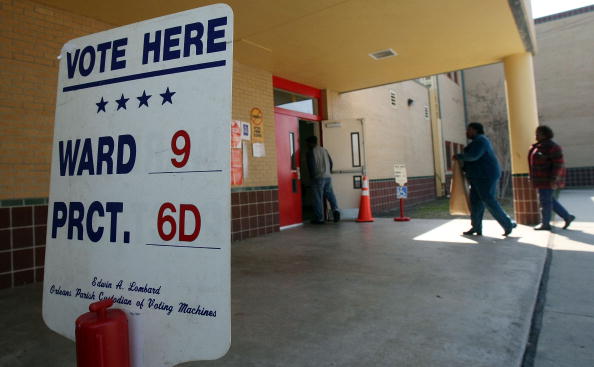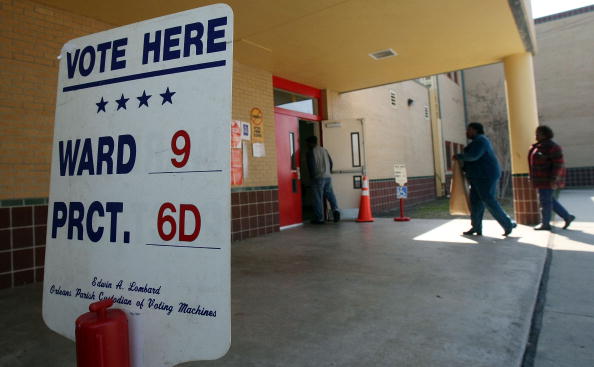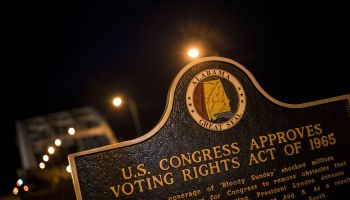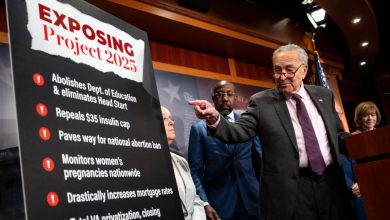Judges Reject Newly Drawn Black District


NEW ORLEANS – FEBRUARY 09: Voters enter a polling place in the Lower 9th Ward to cast their ballots in the state’s presidential primary on February 9, 2008, in New Orleans, Louisiana. | Source: Mario Tama / Getty
In January, the Louisiana Senate passed a new congressional map that would create a second majority-Black voting district in the state, which is about 32% Black. The bill to establish the new map received bipartisan support and was approved by both chambers of Congress after it was determined that the previously existing voting map intentionally diluted Black voting power—which has become quite the trend in red-state America. (I’m looking at you, Florida, Alabama, Georgia, South Carolina and Texas.)
Well, on Tuesday, a pair of federal judges who were appointed by Donald Trump reversed all of that and prohibited Louisiana from using the map in this fall’s elections.
From MSNBC:
Black Louisianans and a number of civil rights organizations have already filed an appeal to the Supreme Court. And Louisiana Attorney General Liz Murrill, a Republican, told the USA Today Network, “We will of course be seeking (Supreme Court) review,” adding, “I’ve said all along the Supreme Court needs to clear this up.”
The 2-1 decision out of the U.S. District Court for the Western District of Louisiana effectively undercuts a previous federal court ruling that found that a map proposed by the state Legislature unlawfully diluted Black voter power. Or put another way: It was effectively racist. The state’s Republican governor even signed off on the new map, over some objections from the far right.
First of all, you know a state’s congressional map was racist when members of the DEI, critical race theory and “woke”-hating Republican party were like: “Yeah—we’re going to need to change that.”
Much like the faux logic Florida Gov. Ron DeSantis sued in defending Florida’s “race-neutral” map, the federal judges in this case argued that establishing another majority-Black voter district to correct the intentional anti-Black voter racism of the previous map was itself a violation of laws prohibiting racist voting maps (read: maps that are racist against white people *rolls eyes*.)
“The predominate role of race in the State’s decisions is reflected in the statements of legislative decision-makers, the division of cities and parishes along racial lines, the unusual shape of the district, and the evidence that the contours of the district were drawn to absorb sufficient numbers of Black-majority neighborhoods to achieve the goal of a functioning majority-Black district,” the justices wrote.
So, as usual, we have conservatives in power who are denying the long history of systemic racism against Black people—specifically, Black voters in this case—and pretending that legislation aimed at righting those wrongs are racially discriminatory against the most socially privileged racial group in America. Again, black people represent, by a wide margin, the second-largest racial group in Louisiana after white people. At 32%, it would only make sense that two of the state’s six congressional districts are majority Black. In fact, just to further show how perverse these judges were in crafting this white-and-fragile ruling, they argued that the state’s new map violated the 14th Amendment, which was cited to give voting rights to formerly enslaved Black people.
Anyway, on Wednesday, a group of Black voters and civic organizations filed a notice of appeal to the U.S. Supreme Court hoping to reverse the justices’ decision.
“We will continue to fight for a map that fairly represents Black Louisianians during and beyond the 2024 congressional elections,” said Stuart Naifeh, redistricting manager for the Legal Defense Fund, according to a press release sent to NewsOne. “Today’s decision creates chaos and confusion and is a slap in the face to Black voters who have already gone through one congressional election under a map that dilutes their votes. The law is clear that states must abide by the Voting Rights Act and can properly consider race when doing so, as the Supreme Court told us just last year. We will not stand by for another election without a fair map for Louisiana.”
While we’re here, it’s worth noting that there have been a few racially and constitutionally questionable moves being made in Louisiana as of late. Louisiana Gov. Jeff Landry is supporting House Bill 800, which would task legislators with convening on May 20 to write a new state constitution by June 15 and put it on the ballot during the 2024 presidential election. As we reported earlier this week: “This narrow window would make it hard for Louisianians to understand the process, offer input, or ensure that their rights are protected.”
Also this week, the Louisiana Supreme Court overturned the rulings of lower courts that rejected a bid for the majority-white village of St. George to essentially secede from the majority-Black state capital, Baton Rouge, a move the Louisiana chapter of the NAACP says “poses significant risks to our education system, threatens the continuity of critical programs, and challenges community representation.”
So, basically, Louisiana officials have been on one lately. This is America.
SEE ALSO:
Louisiana Becomes Latest State To Create New Majority-Black Voting District
Supreme Court Reinstates Louisiana Voting Map Deemed Racist By Federal Judge





